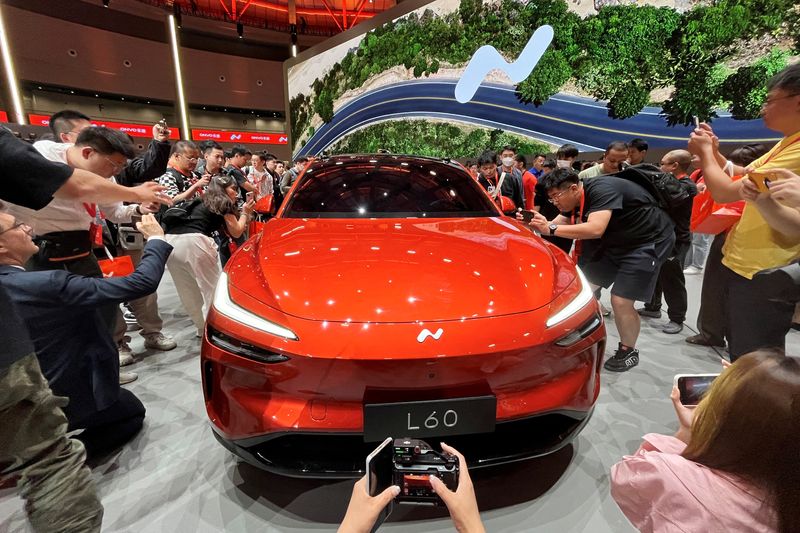By David Shepardson, Nora Eckert and Abhirup Roy
WASHINGTON/DETROIT (Reuters) -The Biden administration's proposed ban on Chinese connected-car technology could prove its strongest weapon yet to fend off an onslaught of cheap Chinese electric vehicles that has upended the global auto industry.
The ban on hardware and software, announced Monday by the U.S. Commerce Department, is the administration's latest salvo after imposing 100% tariffs on Chinese EVs and denying a $7,500 consumer EV subsidy to any vehicle with made-in-China components.
Unlike those measures, the connected-car tech prohibition would apply even to cars built by Chinese firms outside China - such as in Mexico or Europe, where they're planning factories.
"It's a powerful statement," said Michael Dunne, a consultant who closely follows the China auto industry. After imposing high tariffs, he said, U.S. officials "looked at it again and said: 'Is that going to be enough?' And they concluded - probably not."
Chinese EV leader BYD (SZ:002594) has said it plans a Mexico plant. While it has emphasized the factory would only serve the local market, U.S. trade groups are wary, saying Chinese EVs could cause an "extinction-level event" for U.S. automakers.
Biden's proposal also calls for barring Chinese software or self-driving cars from testing or deployment, effectively creating a trade barrier that could protect U.S. EV pioneer Tesla (NASDAQ:TSLA) and other automakers seeking to develop robotaxis, analysts said. Tesla's Elon Musk has this year increasingly staked the company's future on autonomous technology, another sector where it faces stiff Chinese competition.
Analysts warn of China trade-policy retaliation, which could target Tesla's sprawling China operations. Tesla did not respond to a request for comment.
Biden administration officials on Monday cast the threat of Chinese vehicles and technology as both a national-security threat that could enable espionage and an economic threat. China's heavily subsidized EV sector has been a leader in both battery and software technology, including systems for in-dash driver features.
Few Chinese-made vehicles are currently sold in the United States - and none from Chinese brands. Monday's action aims to keep it that way by closing loopholes, U.S. Commerce officials said.
"If we had just said, 'No Chinese vehicles,' we would really have been leaving a front door open for China to come in via automotive software," said Liz Cannon, who heads the department's information and communications technology office.
The Biden plan would prohibit software in 2026, for 2027 model vehicles, and hardware for the 2030 model year. The administration hopes to finalize the new rules before Biden leaves office on Jan. 20, 2025.
Chinese officials warned before Monday's announcement that they would defend the nation's interests.
"China opposes the U.S. generalization of the concept of national security and discriminatory practices against Chinese companies and products," said China Foreign Ministry spokesperson Lin Jian.
China's foreign ministry declined to comment further on Monday.
Canada, whose auto industry is closely aligned with the U.S., is "absolutely" considering a similar ban, Canada's Finance Minister Chrystia Freeland said on Tuesday.
SECURITY CONCERNS
U.S. lawmakers have expressed security concerns about Chinese autonomous-vehicle technology being tested in the United States.
Earlier this year, the Biden administration added China-based Hesai Group - whose lidars help autonomous-driving systems create three-dimensional road maps - to a list of companies allegedly working with Beijing's military. Hesai, whose customers include robotaxi firms including General Motors (NYSE:GM)' Cruise and Amazon (NASDAQ:AMZN)'s Zoox, denied the allegations and sued the government.
On Monday, White House economic advisor Lael Brainard noted that China fired the first shot in the brewing trade war by limiting where Tesla vehicles, with their cameras, can drive in China, citing national-security concerns. Those restrictions were removed earlier this year after China officials found Tesla's data collection complied with its regulations.
The Biden administration officials raised national-security concerns in proposing the car-tech ban, citing fears that drivers' privacy could be invaded or their vehicles could be remotely controlled from abroad. But they also acknowledged seeking to protect the economic security of U.S. automakers.
"We also are very focused on the competition aspect and making sure that our manufacturers can compete fairly," Brainard said.
The White House said it has ample evidence of China malware in critical American infrastructure, but did not provide evidence China is using automobiles to spy.
BUY-AMERICAN PUSH
Electric vehicles and trade policy have been major themes of the 2024 U.S. presidential campaign, with anti-China measures being a rare point of bipartisan agreement.
Republican presidential nominee Donald Trump has suggested China could dominate auto production and railed against Biden's policies to promote electric vehicles. On Monday, Brainard said Biden doesn't want Chinese vehicles flooding the U.S. market.
"When Americans do choose electric vehicles, we want to make sure they choose an American vehicle - not a Chinese vehicle," she said.

Democrat Kamala Harris' campaign did not comment.
"There's Chinese tech in so many products that come into the U.S.," said Sam Fiorani, vice president at research firm AutoForecast Solutions. "Figuring out where you draw that line ... is going to be very difficult."